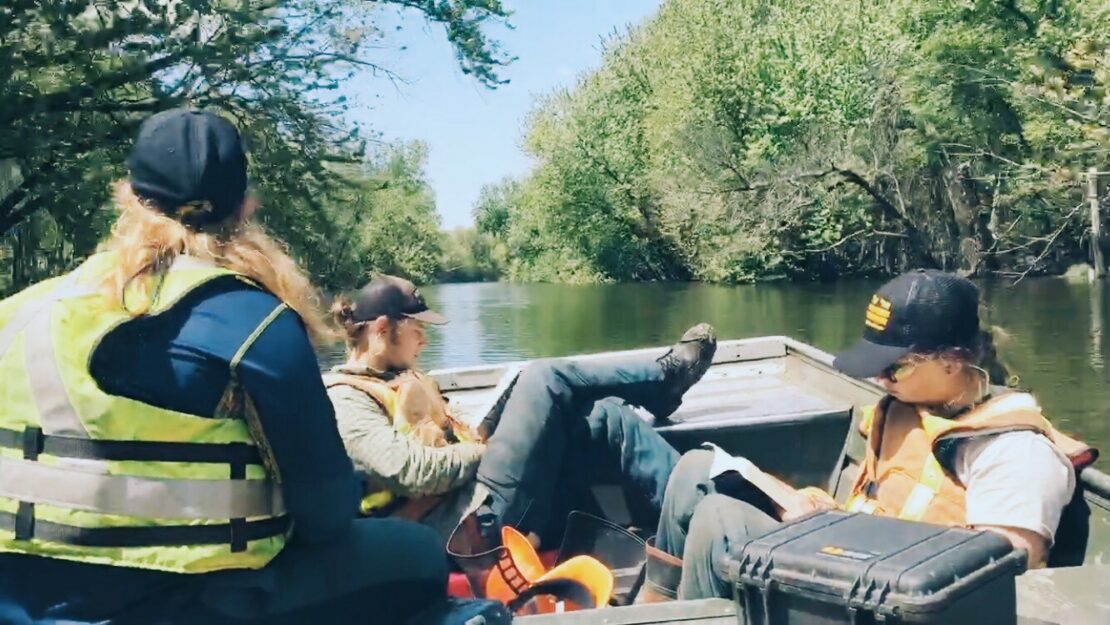Lost and Found

By: Alaine Dickman

Sunny morning heading upstream on the South Fork of the Crow River
I remember the long hikes, the trails, wildflowers honoring the short life of a Black Labrador, Whoopi, blanketing her grave. We had a swing set, an apple tree far off from the house, a long gravel driveway and farm cats. Shouldn’t I remember more? The first four years of my life zigzag and ricochet untamed imagination, dreams and nightmares repeating so often that any toddler would confuse them with reality and be forced to believe those events hysterical and tragic occurring behind closed eyelids had truly been lived, and the actual yet dramatized moments of the early years of my life.
Kingfishers. Every sighting which is not seldom, I see my father. I see Frank Sinatra. I hear the Rat Pack. 10 years at least have passed since I stood on a bank fishing with my father, humming big band music fishing on the Wisconsin River near Merrill, the town my family moved to the year I turned five. Just before moving to Merrill my father sold his boat. We had a boat? What else is anchored in the depths of my memory?
We meet our water trail early every Monday afternoon after loading the truck, grocery shopping, fueling the truck and gas cans and a restroo,m break. Life jackets, chainsaw pants, steel toe rubber boots and occasionally waders are on the body. Four red flotation devices better known to my crew as “butt squares”, two chainsaws, gasoline, bar oil, a toolbox, 5 gallons of water, the lunch cooler, a hand saw, wedges and a mallet, loppers, two canoe paddles, a first aid kit, a dry bag and a dry box all aboard. The last to step onto the boat does so with an extra push and pointed toe.
The tiller takes us upstream until halted by a snag. Each obstruction is photographed and documented with the crew iPad that lives in the dry box. We call this taking “a point.” The two remaining crew members are at the bow, preparing the saw, (we tend to favor our newest saw, Log Lady). Check for gas, check for oil, appropriately set the tension of the chain and fire her up. Cuts are made under water, at the surface or above. With as little disturbance to natural habitat as possible the objective is to clear a safe passage for canoes and small boats heading downstream.
Focus on the logs, the trees, their limbs and reactions to cuts, avoid pinching the saw. Focus on the current; direction, flow rate, position of the boat and sawyer. Act intentionally, safely, selflessly. Move the butt squares out from under your feet or the feet of your partner. Have a (golden) scrench handy, a wedge handy, a set of eyes handy, a hand handy.
Previously I have mentioned how much discipline this job requires. My point is proven again and again week after week and the room for improvement only tapers as distractions are showing up in a manner unexpected. Last week as we traveled upstream I put my ear plugs in to soften the sound of the motor. At the act of deliberately avoiding it’s unpleasant sound, the relief as the earplugs expanded creating a false distance between myself and the source, I found myself wondering how many times I have a chosen intentionally a simpler, more quiet path and neglected the noise that begs and needs my attention from another direction. Consuming thoughts, anxiety inducing; sidetracked. How do others prioritize their thoughts and presence of mind each work week? How many others are squinting to see childhood memories, are caught off guard pondering decisions a younger version of themselves made and how many of my peers can set that all aside because they’ve got a job to do?
I anticipated when applying to serve with the Conservation Corps that I would adore my experiences, I would find fulfillment and I would in some fashion journal our adventures week to week. Fulfillment has perfect attendance, I jot notes and daily events each night, preserving freshness and accuracy. Adoration is absolutely present because just the hint of nostalgia has a heartwarming effect. I just did not anticipate a rugged hike down memory lane to put up such a fight for my attention, for the present to lack as much mercy as the past.
Every week and every day that I put on a life jacket and sit in our boat and deliver my ears to the birds and admire the Kingfisher’s dapper attire, smell the river and witness Spring lunge upwards then surrender to Summer, I sense the shadow of a memory I can’t quite catch. I must have sat in that boat. But on what river and at what age? How many worms did I fumble in my tiny palms and tear apart, if I even volunteered to touch them? Was I afraid of the fish, their big eyes, gaping mouths and strange gills? Which of my siblings were there? I can’t pull a clear picture from my memory bank with complete certainty my imagination or a sibling’s story hasn’t bled into my own reality and if I think for too long my patience wanes like the patience of icebergs and I make no progress towards that portion of my past. I often settle for flashes of a small boat on a trailer, a gravel road through the woods to a river or a lake or some body of water, the smell of red, puffy life jackets and the gentle whip of a cast. Familiarity is aggressively scribbled outside the lines and just out of reach. But it’s okay: Every lunch break is another chance to briefly sneak up on the past. My practice is that focus lies with the work but during these breaks I can welcome distractions that fly by as often as Frank Sinatra and when the timing is right I’ll fly away with him.